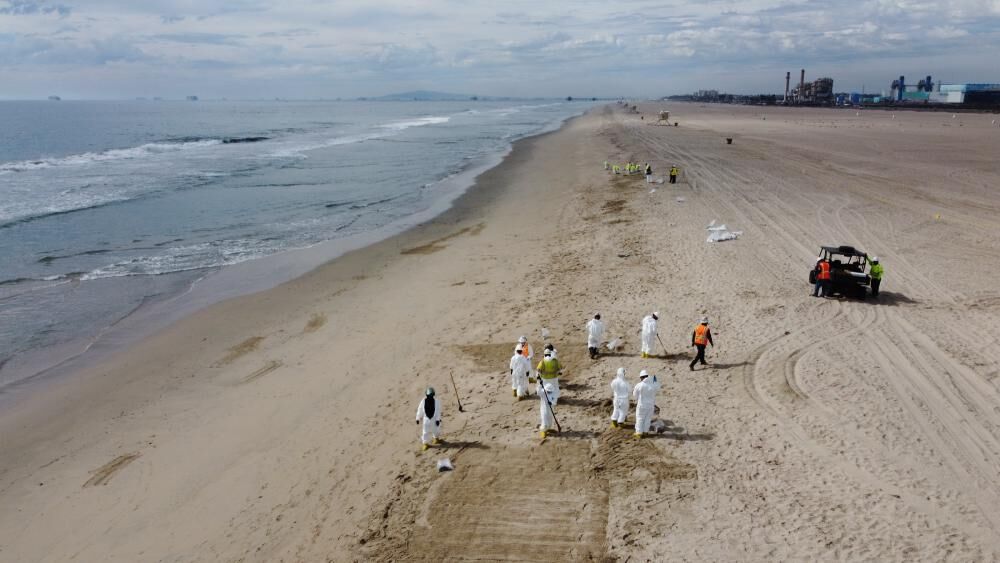
Scientists, volunteers, and members of the United States Coast Guard (USCG) and California Department of Fish and Wildlife were scrambling to contain and clean up a Friday evening oil spill that dumped at least 126,000 gallons of oil into the Catalina Channel between Long Beach and Santa Catalina Island.
The spill was not expected to affect Malibu beaches, with the current running southeast toward Newport and Huntington beaches, according to reporting by the LA Times. However, KBUU News predicted multiple beach closures, including Newport, Laguna, Huntington and other popular destinations, could have more beachgoers heading up north toward Malibu in the next several weeks.
The oil spill, estimated at 13 square miles, was first reported on Saturday morning, although the USCG later admitted it was notified of a potential spill 12 hours earlier but did not investigate “because it didn’t have enough corroborating evidence,” according to the Associated Press.
As of Tuesday morning, Oct. 5, an estimated 15.67 miles of “light oiling” was reported along the Southern California coast; six miles of shoreline had been cleaned of oil, according to the USCG.
A total of 15 birds had been rescued—all but two of them alive—from the oil-slicked waters, according to the UC Davis Oiled Wildlife Care Network, in charge of marine life rescue efforts. Those numbers were last updated as of 8:55 p.m. Tuesday, Oct. 5.
It was expected that other marine wildlife would soon begin to appear, according to LA Times reporting. According to the Times, the Pacific Marine Mammal Center’s Krysta Higuchi said it was an “all hands on deck kind of situation.”
“We usually see the marine mammals a couple of days to a couple of weeks after an event,” Higuchi told that newspaper, which added that “the Pacific Marine Mammal Center will be doing intake and triage on seals and sea lions. Whales or dolphins will be transported to Sea World in San Diego because that facility has bigger tanks.”
The cause of the oil spill was still under investigation. Speculation was that a cargo ship—perhaps one of the dozens reported waiting to unload off the Port of Long Beach—may have dragged an anchor over a pipeline, causing the leak. The USCG was investigating that as a possible cause of the leak, according to multiple reports. The oil, investigators suspect, came from a pipeline servicing an off-shore oil platform called Elly, originally built by Royal Dutch Shell in 1980, according to reporting from LAist/KPCC.
In the meantime, everyone from the California Coastal Commission to the National Resources Defense Council and from National Geographic to Erin Brockovich have weighed in on the ecological disaster.
On Tuesday morning, Malibu’s congressman in Washington, Representative Ted Lieu, issued a joint statement with Representative Julia Brownley (representing Ventura County)—the two chair the California Coastal Caucus—calling for a federal ban on offshore drilling.
“Oil spills are one of the greatest perpetual threats to our coastal communities. We are alarmed and dismayed by the Elly oil spill near Huntington Beach, which has already caused significant damage to our California coastline,” the joint statement read. “We’re grateful for the U.S. Coast Guard and all local and federal oil recovery efforts. Wildlife organizations are also working tirelessly to save animal and plant life. While the recovery efforts have so far been heroic, this should not have happened in the first place … The majority of Californians oppose offshore drilling and with aging infrastructure, we’re likely to see more oil spills in the future if we don’t make a change now. We need to end offshore drilling, which is why we, as the cochairs of the California Coastal Caucus, are urging our colleagues to support a federal ban on offshore drilling.”
